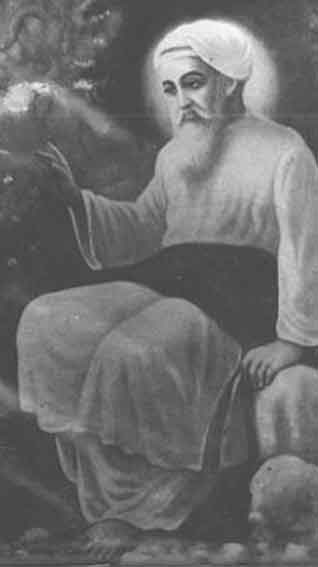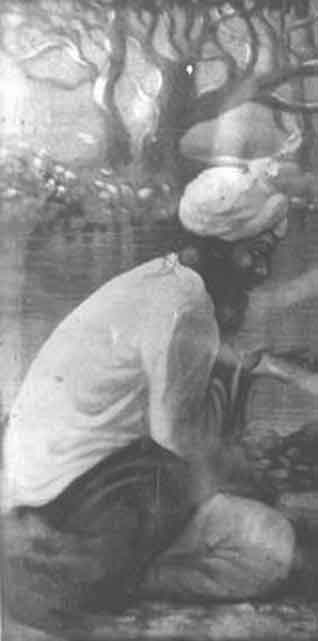
Images, above and below: details from an old, historical illustration of Guru Nanak and Lehna. Origin unknown.

Faith
Am I A Sikh?
How Much?
Part III
HARBANS LAL
Continued …
Part III
Let me further explain what I mean regarding the parallels between what Guru Nanak says about Hindus and Muslims and how he recommends we, Sikhs, live our lives.
For example, an ambiguity detected in the Islamic tradition is similar to ours. There, as with us, the word "Muslim" is used both as a noun and as an adjective: the noun, formal and mundane, designating membership in a historical community as a superficial fact, while the adjective refers to content designating an internal attitude and orientation.
Ask a member of the Islamic community if he is a “Muslim," and the answer is “yes" forthrightly, sensing no problem and registering no prior or subsequent thought.
Ask him, however, if he is Muslim, and he shows great sensitivity and responsibility if he can answer convincingly and without a reverent consternation.
"Muslim" in Arabic means one who "submits" or is "self-committing," so that to affirm that a person is “Muslim” is to speak of one’s quality of heart, one’s commitment to God, and one’s readiness to obey whatever injunctions the sacred book may make incumbent on that person.
Two persons may both be Muslims, but one of them may be more Muslim than the other; the same person may be more Muslim in one situation than in another, more Muslim one morning than in the same afternoon.
* * * * *
A perusal of the Guru Granth repeatedly confronts us with the universality of the Sikh religion and thereby the faith of its followers who may define themselves as Sikhs.
To take the great Sikh scriptural figure of Bhagat Sheikh Farid, might one say that he was not a Sikh as he was a Muslim?
True, but he was Sikh on account of his beliefs, teachings and high living. His verses were included in our sacred scripture even though he declared himself to be a Muslim. He freely used Muslim idioms and metaphors in his verses.
The same can be said of Bhagat Kabir and other non-Guru contributors to the Sikh Scripture. All of them are fully accepted as channels of revelation that unequivocally constitutes the Sikh Scripture.
In Sikh history, Saa-ee(n) Mee-aa(n) Mir can be taken as another figure that may be helpful to our discussion. Guru Arjan singled him out, from all his contemporaries, Sikhs and non-Sikhs, to lay the foundation stone of the Harmandar Sahib -- the Golden Temple, as we know it today -- that the Guru was constructing to house the sacred Sikh Scripture.
Since that time, Sikhs have treated Mian Mir with the highest regard, even though he was unequivocally a Muslim. In quality, he was Sikh and therefore given the unique honor by Guru Arjan.
Until only a few years ago -- that is, for several centuries after the time of our Gurus, and including their contemporary period -- Sikhs enjoyed kirtan of the hymns from the Sikh Scripture sung by Muslim musicians, even within the innermost sanctuary of the Golden Temple.
I realize that considerations such as these will arouse cross-cultural implications that may complicate the issue. However, their discussion is necessary as it enriches our understanding.
ONLY A SIKH
Personally, I am not a Muslim, nor a Jew, nor a Hindu, nor a Christian.
But I am a Sikh.
Again, my answer to a question on this point is quick, clear, and definite.
Yet, if the question raised is, am I Sikh ... or Muslim, Hindu, etc .. the answer is not quick and clear, nor is it definite.
I do not speak Arabic or Sanskrit, nor do I observe Hindu or Muslim rituals normally.
Instead, I was named -- as a child -- in the historic Gurdwara Punja Sahib. As an adult, I was married according to the Sikh tradition of Anand Karaj.
Here the adjective is in the form of a question: does it apply to me, or can I apply it to myself?
The only possible answer that I can give to this question is that I hope to be Muslim in the sense described above in my Guru’s hymns as much as I long to be Sikh as my Guru ordained in the same scripture. Any other answer would be blasphemous and arrogant.
I can also be a Muslim in the sense that the Guru practiced Islam on occasion himself. Guru Nanak even wore Muslim garb and carried the Qur’an to Makkah with the intention of participating in the Hajj. He spent around two years in Makkah, Medina, and Baghdad among Muslim mullahs and ullmans.
I should be obedient to God's Will and be charitable to God’s creation; as readily as God gives me courage and ability. I am not, alas, in the practice of my life, as Muslim as a good Sikh could be. But certainly I could aspire to be.
One cannot be both a Sikh and a Muslim or a Hindu or a Christian at the same time.
Nouns are there to keep us separately identifiable. On the other hand, it is not, I suggest, as ridiculous or fanciful as it might sound, to ask whether in the realm of adjectives it might not be possible for a person to be both Sikh and Muslim some times.
I for one can understand and consent to the meanings for the terms in which this is possible. I could even say that to be truly Sikh is ipso facto to be truly Muslim, Buddhist, Hindu, Jew, or Christian some times.
Those of you whose hearts God has opened to surrender and who are fortunate to be blessed by the Guru’s commandments, would not think in terms of such particularities of adjectives to characterize the quality of their orientation. Whether you know it or not, these adjectives are there in Sikhi to actually describe the mind-set to which one hopes to rise to, in one’s best moments.
CONCLUSION
It is a highly rewarding exercise to inquire more discerningly what our founders and the enlightened souls have meant when they understood "Sikh" as a noun or an adjective, or even a verb. It is equally rewarding to ask oneself what one means, or proposes to mean, by this term of our faith, not merely when one is about to use it in a speech or in writing, but also when one is in one’s trying moments.
In conclusion, let us make life simpler and enjoyable by claiming only one faith, the noun Sikh, and the adjective Sikh. Then in the silence of our room, in the hub-bubs of the daily scuffle, in the busy current of our routines, or in our crises and predicaments, look for opportunities to value our faith in reflecting on what "Sikh" might mean right then and there.
Each morning as we arise, we might well ask ourselves what we intend to make the word Sikh mean for ourselves that day.
Concluded.
[Courtesy: The Sikh Review. Edited for sikhchic.com]
July 21, 2013
Conversation about this article
1: Sangat Singh (Kuala Lumpur, Malaysia ), July 22, 2013, 9:02 PM.
"Sikhi sikhi-aa gur veechar / nadree karam laghaa-ay par" [GGS:465.10] - "Contemplating the Guru, I have learnt these teachings. Bestowing His grace, He carries His servant across."
2: Harinder Pal Singh (Patiala, Punjab ), July 23, 2013, 6:25 AM.
Sikhism is in the clutches of modern 'masands' whose sole aim is to grab power and money and make Sikhism more complex so as to have their monopoly. Wish somebody could translate this article and hammer it into their cranium for subtleties they don't understand. When I read the article by Harbans Lal ji, I stood up and bowed my head. How simply he has put across the simplicity of what a Sikh and Sikhism is! Such a beautiful collection of thoughts and so appealing to the heart and reason is Sikhism but our self-appointed rcustodians have choked it to a shrinking proposition. If somebody deserves the highest accolade of the panth, then it is this learned man. Sir, may your tribe increase! Mai(n) apna izhar-e-akidat lafzan wich chhota nahi kar sakda (I can't belittle my gratitude by putting it in mere words) ... but a salutation right from the heart again.
3: Ravinder Singh (Mumbai, India), July 25, 2013, 2:35 AM.
Our Guru has given us the definitions. Gurbani defines Sikhi as learning from the Guru's wisdom. Guru Gobind Singh through his Hukamnamah has proclaimed his entire sangat as the khalsa. These definitions are eternal.
4: Ravinder Singh (Mumbai, India), July 26, 2013, 1:48 AM.
"Truth is high, but higher still is truthful living" -- Guru Nanak. "Character, not the Sikh, is dear to me" -- Guru Gobind Singh.


